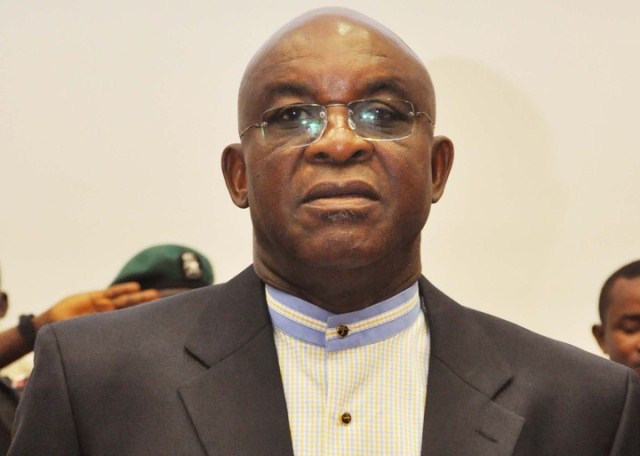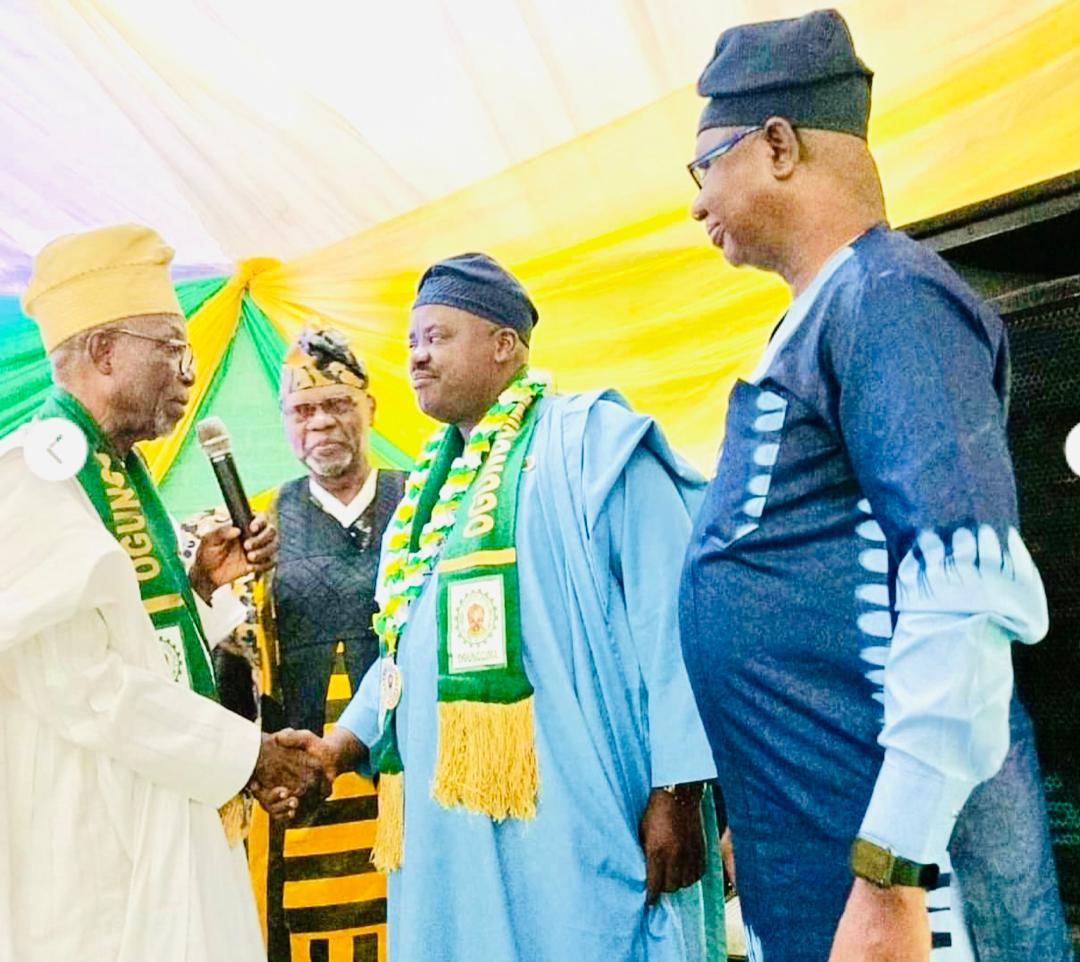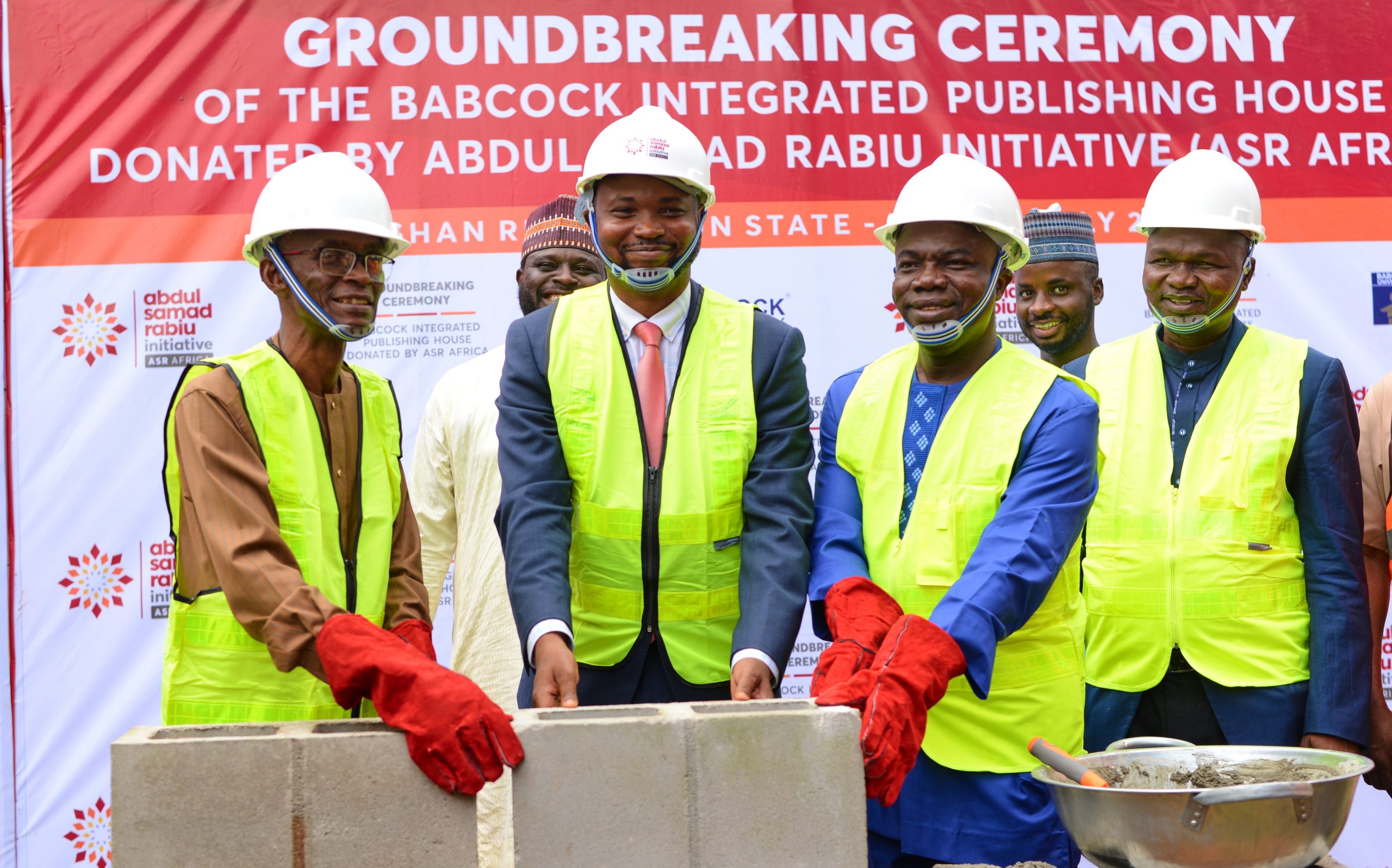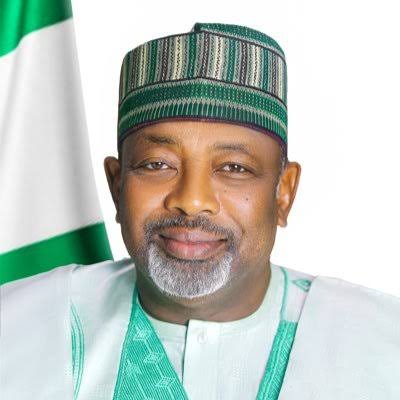Business
How David Mark illegally acquired official residence of the Senate President – FG Reveals
Published
7 years agoon

The Federal Government has accused a former Senate President, David Mark, of illegally acquiring his then official residence as his private property.
In September this year, the government, through the Special Presidential Investigation Panel for the Recovery of Public Property, which is chaired by Chief Okoi Obono-Obla, gave the former Senate President a 21-day notice to quit the mansion.
The notice to quit, however, asked Mark to “show cause” why the Federal Government should not “enforce the recovery of the property for public good.”
But Mark had quickly filed a suit before the Federal High Court in Abuja to quash all steps taken by the panel to evict him and recover the house from him.
The case has not been heard.
The PUNCH, on Monday, obtained from court sources, copies of documents, including exhibits, filed by the former Senate President in his suit challenging the recovery process.
The Senate President’s official residence is sited on 1.6 hectares of land at 1 Musa Usman Street, (also known as No. 1 Chuba Okadigbo Street), Apo Legislative Quarters, Gudu, Abuja.
According to title documents, the property comprises eight structures, made up of the main house, ADC/chief security detail’s house, guest chalet, security/generator house, boys quarters, security post, driver/servants’ quarters and chapel.
The eight structures are said to be properly spaced and linked with well-paved drive and walkways and further done with lawns.
Mark, the senator, currently representing Benue South in the National Assembly, is accused of illegally acquiring the property with the approval of former President Goodluck Jonathan despite that such property was excluded from the monetisation policy of the Federal Government.
Copies of correspondences and other documents, leading to the purchase and eventual handover of the property to Mark in April, 2011, showed that the serving senator purchased the property at a “reserved price” of N673,200,000.
Meanwhile, in his letter, dated October 28, 2010, seeking the then President Jonathan’s approval for the sale of the property, the then Minister of the Federal Capital Territory, Mr. Bala Mohammed, had indicated that the open market value of the property was N748,000,000.
In addition, the then minister specifically stated that the Federal Executive Council had, in 2004, mandated the Federal Capital Territory Administration to sell all Federal Government’s “non-essential housing units in Abuja under specific rules and guidelines.”
Exempted from this arrangement are the official residences of the Senate President, the Deputy Senate President, the Speaker of the House of Representatives and the Deputy Speaker.
He stated that the exemption was “expressly contained in the Federal Government of Nigeria’s Official Gazette No. 82, Vol. 92 of August 15, 2005.”
In justifying the request for the then President’s approval for the sale, the former minister noted that all the houses in Apo Legislative Quarters, with the exception of the official residences of the four principal officers of the National Assembly, had been sold to the legislators occupying them at the time or the general public, under the Federal Government’s monetisation arrangement.
The former minister however stated that sale of other houses in the Apo Legislative Quarters had “altered the general security provision for the area and extension, the security of the leading principal officers of the National Assembly.”
The letter added, “This lapse in the general security provision of the area led the National Assembly to unofficially rent residential accommodation for its leading principal officers in more secure areas within the city.”
It also stated that due to the security concerns, the four houses of the leading principal officers “will no longer have the status of ‘essential properties’,” hence the FCTA “has made provision in the budget to construct residential accommodation for the leading principal officers of the National Assembly where the general security is befitting the status of the officers.”
The then minister had stated that the Senate President’s residence had an open market value of N748,000,000; the Speaker’s N670,000,000; the Deputy Senate President’s N458,000,000; and the Deputy Speaker’s N348,500,000.
What appeared on the then minister’s letter as Jonathan’s hand-written approval of the request dated November 15, 2010, read, “Para 6 and 8 approved. Also see if this could be gazetted.
“N/B: Ensure that the new residences are ready early next year.”
By a letter, with reference number PRES/83/FCTA/18 and dated November 18, 2010, Jonathan conveyed his approval to the then minister’s request for the sale of the Senate President’s official residence.
The letter, addressed to the FCT minister and titled, ‘Re: Sale of Residential Houses Occupied by Leading Principal Officers of the National Assembly’, was signed by the then President’s Senior Special Assistant (Admin), Matt Aikhionbare.
The letter read in part, “I am directed to forward Reference A to you and to convey to you, Mr. President’s approval of paragraphs 6 and 8 and further directive on page 2 in line with the earlier approval of 27/06/2010.”
But by a letter with reference number SPIP/INV/2017/VOL.1/17 and dated September 5, 2017, the Obono-Obla-led Special Presidential Investigation Panel for the Recovery of Public Property insisted that Mark acquired the “national monument” in clear breach of the monetisation policy of the Federal Government.
The letter, signed by Obono-Obla and titled ‘Investigation activities: Notice to recover public property in your care’, and addressed to Mark, stated in part, “The extant Monetisation Policy of the Federal Government, as enunciated and still being implemented, excludes all Principal Officers of the National Assembly and hence places the responsibility on the Federal Government to provide accommodation for them, same which you allegedly illegally appropriated.”
The letter asked Mark “to take steps within the next 21 days to vacate the said property or show cause why the government of the Federal Republic of Nigeria should not enforce the recovery of the said property for public good.”
It added, “You are further being notified pursuant to the Recovery Property (Special Provisions) Act, 1983, to complete and return within 30 days the attached Form B (Declaration of Assets Form) to the office of the undersigned.”
But Mark, through his lawyer, Ken Ikonne, filed the suit marked FHC/ABJ/CS/1037/2017 before the Federal High Court in Abuja, insisting that he legally acquired the property through a “walk-in bid” at the behest of the FCTA.
He also contended that the recovery process initiated by the Federal Government was unconstitutional.
The Attorney General of the Federation and Obono-Obla are joined as respondents to the suit.
Among his prayers, Mark sought “a declaration that the unilateral declaration by the defendants that the plaintiff’s acquisition” of the property “is illegal and the order compelling the plaintiff to vacate the aforesaid property” without affording him “a hearing,” amounted to a denial of his “fundamental rights to fair hearing and property, and are therefore unconstitutional and void.”
He also sought a declaration that “the service by the defendants on the plaintiff of the Notice to Declare His Assets (Form A) and the Assets Declaration Form B is unconstitutional and thus void.”
He sought “an order quashing” the defendants’ declaration of his acquisition of the aforesaid property as illegal, and another order “quashing the order of the defendants” compelling him to vacate the aforesaid property.”
He also applied for an order of the court “quashing the Notice to Declare Assets Form A and the Assets Declaration Form B” served on him and “a perpetual injunction restraining the defendants, jointly and severally” or through any agent “from evicting the plaintiff from the said property, or recovering same from him.”
Mark said he was occupying the said property in 2010 when the FCTA, “citing security concerns”, decided to construct new official residences for the leadership of the National Assembly, including the President of the Senate, in a more secure and conducive environment.”
According to the former Senate President, the FCTA had insisted that the reserve price of N673,200,000.00 reflected the open market value of the property.
He added that the valuers of the FCT that inspected and carried out a valuation of the property had put the “replacement cost” of the property at N492,700,000.
He said he duly accepted the offer on April 21, 2011 and paid the “agreed purchase price to the Ad hoc Committee on Sale of FGN Houses” on April 27, 2011.
He said the house now served as his family home in Abuja.
But he said surprisingly he was on October 9, 2017 served a letter of investigation activities dated September 5, 2017, by the Okono-Obla-led panel.
He stated in his suit that, “the defendants (AGF and Obono-Obla) unilaterally, and without affording me any hearing at all, and without any order of any court, declared my acquisition of the said property illegal, and ordered me to vacate the said property failing which the defendants would enforce the recovery of the property against me.”
EFCC grills Benue senator for seven hours, seizes passport
Meanwhile, the Economic and Financial Crimes Commission, on Monday, interrogated the immediate past Senate President, David Mark, for seven hours, The PUNCH has learnt.
Impeccable sources within the EFCC told one of our correspondents that Mark’s passport was also seized before he was allowed to go on an administrative bail.
The PUNCH learnt that Mark, who served as Senate President from 2007 to 2015, arrived at the Abuja office of the EFCC around 12noon and was released at 7pm.
The source added, “The former Senate President arrived around 12pm and spent seven hours responding to several questions from detectives.
“He was released at 7pm on the condition that he must submit his passport to the commission which he did.
“Senator Mark is expected to return soon to answer more questions”
The former Senate President is expected to account for over N5.4bn slush cash and campaign funds allegedly traced to him.
He was alleged to have received over N500m from the government of former President Goodluck Jonathan during the build-up to the 2015 presidential election.
The money is alleged to have been part of the $2.1bn meant for arms procurement.
The Senator, who has been representing Benue-South Senatorial District since 1999, is also accused of sharing N2.9bn to his colleagues while presiding over the upper legislative chamber.
The former Senate President has, however, denied all the allegations levelled against him.
In a statement on Sunday, Mark said, “To set the records straight, Senator Mark was invited by the EFCC via a letter addressed to the National Assembly to answer questions on the 2015 presidential election campaign funds as it concerned Benue State.
“As a law-abiding citizen, Senator Mark honoured the invitation.
“Curiously, they also alleged that the PDP paid over N2bn into the National Assembly’s account which he, as then President of the Senate, allegedly shared among the 109 senators, including PDP, Action Congress of Nigeria and All Nigerian Peoples Party (members) in 2010.
“Again, to the best of his knowledge, Senator Mark is not aware of such transactions. This simply did not make sense to any right thinking member of society.
“Senator Mark wondered why anybody would think that PDP will pay money into National Assembly account. He, however, clarified all the issues raised before returning home.”
Related
Sahara weekly online is published by First Sahara weekly international. contact [email protected]

You may like
Business
Lion Oshiyemi Pledges redefinition, reposition as he emerges 20th President of OGUNCCIMA
Published
3 hours agoon
July 26, 2024
Lion Oshiyemi Pledges redefinition, reposition as he emerges 20th President of OGUNCCIMA
Lion Niyi Oshiyemi has been invested as the 20th President of the Ogun State Chambers of Commerce, Industry, Mines and Agriculture (OGUNCCIMA) at the Chamber’s 40th Annual General Meeting.
The investiture ceremony of the new OGUNCCIMA leadership was held on Thursday at Tunwase Hall in Ijebu Ode, Ogun State with top Chamber movement members in attendance.
The President In his acceptance speech, expressed gratitude to the immediate past President, Engr. Mike Akingbade, and the Chamber for entrusting him with the esteemed position.
He pledged to leverage available opportunities to redefine and reposition the Chamber, creating platforms to influence legislation and improve the business environment.
“I am honored to lead this prestigious organization and I promise to harness all available opportunities to redefine and reposition the chamber of commerce movement in the state”.
“I will continue to create platforms to influence legislation and other measures affecting trade, improve the business environment, and build a Nigerian economy of thriving business opportunities through networking”.
“I wish to enjoin you all who represent businesses, if you have not joined the OGUNCCIMA, please come and lend your voice to others. The bigger the network, the louder the voice and the stronger the influence”.
“Our advocacy seeks to ensure that the business community can have its voice heard on issues that are important to it”.
“I’d like to introduce to you my Presidency’s flagship project “OGUNCCIMA Secretariat”: The project is massive and requires a lot, I therefore seek your support and look forward to partnering with all stakeholders – the state government and it’s agencies (Federal and State Ministries, Departments and Agencies), development partners, the diplomatic communities, the media, and other stakeholders”, he said.
Oshiyemi also praised the founding fathers of the Chamber, saying, “I laud the vision of our founding fathers, who have laid a solid foundation for us to build upon. I am committed to taking OGUNCCIMA to greater heights and making it a beacon of hope for businesses in Ogun State.”
The Ogun State Hon. Commissioner for Industry, Trade and Investment, Hon. Adebola Sofela Emmanuel, in his keynote address said by the Permanent Secretary, Ministry of Trade and Investment, Dr. Olu Ola Aikulola, said over the years that the Ogun State Chambers of Commerce, Industry, Mines and Agriculture (OGUNCCIMA), has not only remained a beacon of entrepreneurial excellence, but also partners in driving economic growth, fostering trade, and promoting investment opportunities in the state.
He said: “I would like to extend my heartfelt congratulations to OGUNCCIMA on this historical movement. Forty years of dedicated service to the industrial, trade, and agricultural sectors of Ogun State is no small feat”.
“Over the years, the Ogun State Chambers of Commerce, Industry, Mines and Agriculture (OGUNCCIMA) has not only been a beacon of entrepreneurial excellence but also a pivotal partner in driving industrial growth, fostering trade, and promoting investment opportunities”.
“Today, as we elect new officers to continue this legacy of excellence, I urge all members to approach this process with a spirit of unity, fairness, and foresight. The future of our chambers and the economic well-being of our state depend on the collective wisdom and strategic vision of our leaders”.
“For us, as a government, we will continue to put in place Institutional mechanisms that will guide our various developmental programmes in all sector of the economy”, he added.
In his remarks, NACCIMA President, Dele Kelvin Oye, represented by the Director – General, Olusola Obadimu, urged the new leadership of OGUNCCIMA to reflect on the the Chambers achievements and chart the course for the future.
“Today, as we gather for the 40th Annual General Meeting and Investiture of New Executives, I want to charge the new leadership to be dedicated and build on the achievements of the past administrations”.
“On behalf of NACCIMA, I congratulate the new officers and may our shared efforts continue to bear fruit, and may new officers lead us for greater heights of success and prosperity”, he concluded.
Related
Business
ASR AFRICA FLAGS OFF CONSTRUCTION OF A N280 MILLION INTEGRATED PUBLISHING HOUSE FOR BABCOCK UNIVERSITY, ILISHAN-REMO, OGUN STATE, NIGERIA
Published
6 hours agoon
July 26, 2024
ASR AFRICA FLAGS OFF CONSTRUCTION OF A N280 MILLION INTEGRATED PUBLISHING HOUSE FOR BABCOCK UNIVERSITY, ILISHAN-REMO, OGUN STATE, NIGERIA
Sahara Weekly Reports That The Abdul Samad Rabiu Africa Initiative (ASR Africa), the philanthropic initiative of the Chairman of BUA Group, Abdul Samad Rabiu (CFR, CON), has flagged off the construction of a N280 million Abdul Samad Rabiu Integrated Publishing House for Babcock University, Ilishan-Remo, Ogun State. This project will enhance the capacity of the University from basic press status to a modern, integrated publishing house to encompass publishing, print production, and other related diversified services. The one-storey building facility will serve as a laboratory and studio for training students of communications, media studies, and allied disciplines as well as other disciplines.
At the groundbreaking event, the Vice Chancellor of the University, Prof. Ademola S. Tayo, expressed satisfaction at the nomination by ASR Africa, under its Tertiary Education Grant Scheme. He added that the choice of the project was a response to the vision to take the Mass Communications Department of the University to a whole new level. According to him, the university’s vision is to produce young men and women capable of critical thinking, and problem-solvers capable of proffering innovative solutions to problems of everyday life, be it social, political, and cultural.
In his response, Dr. Ubon Udoh, the Managing Director of ASR Africa, expressed his delight at the University’s choice of establishing an Integrated Publishing House. He added that when information is appropriately applied, human society is empowered to liberate itself from limitations and attain its full potential. Dr Udoh reiterated the commitment of the Chairman of ASR Africa, Abdul Samad Rabiu to supporting quality education within the tertiary education system in Nigeria and urged the institution to focus on the sustainability of this noble project. He also reiterated the importance of cooperation and collaboration between the university and the contractor for the timely delivery of the publishing house.
About ASR Africa
ASR Africa is the brainchild of African Industrialist, Philanthropist, and Chairman of BUA Group, Abdul Samad Rabiu, the Abdul Samad Rabiu Africa Initiative (ASR Africa) was established in 2021 to provide sustainable, impact-based, homegrown solutions to developmental issues affecting Health, Education and Social Development within Africa.
Related
Business
CBOs Laud Minister of Agric Kyari Over Transparent Distribution Of Fertilisers, Foodstuff Across Nigeria
Published
11 hours agoon
July 26, 2024
CBOs Laud Minister of Agric Kyari Over Transparent Distribution Of Fertilisers, Foodstuff Across Nigeria
A network of community-based organizations (CBOs) in Nigeria, the Coalition of Ethnic Nationalities’ Rights Agenda, the South East Revival Coalition, and Progressive Yoruba Youth for Change have applauded the Minister of Agriculture and Food Security, Sen. Abubakar Kyari, for his efforts and transparency in the distribution of food, fertilisers and other farming inputs across the country.
The CBOs gave the commendation at a joint press conference held in Abuja on Thursday. The conference was addressed by Mallam Yusuf Khalifa, National Coordinator of the Coalition of Ethnic Nationalities’ Rights Agenda; Dr. Eberechi Okonkwo, Convener of the South East Revival Coalition; and Comrade Olajide Olumide Adeniyi, Executive Secretary of Progressive Yoruba Youth for Change.
“The Minister of Agriculture and Food Security, Senator Abubakar Kyari has established a reputation for integrity and transparency in the ministry. The transparency in the distribution of food, fertilisers and other farming inputs across the country under Kyari’s stewardship is unprecedented,” the CBOs said.
“Senator Kyari has demonstrated a practical commitment to enhancing food security and nutrition in the country by prioritising equity and fairness in the distribution of food, fertilisers and other farming inputs.
“We salute his sense of nationalism. His fair distribution of farming inputs has laid a strong foundation for a prosperous and sustainable agricultural sector. Kyari’s tireless efforts to revolutionise the agricultural sector as well as to ensure that Nigeria becomes self-sufficient in food production is beyond patriotic.
“His exceptional leadership has made the the issue of marginalization in the distribution of food, fertilisers and other farming inputs, a thing of the past in the country. The effective utilization of resources by the Minister has proven not only instrumental to modernising the agricultural space but also to peace and harmony on farms across the nation.
“We applaud Senator Kyari for championing the emancipation of Nigerian farmers, particularly those in rural communities who previously lacked access to government-distributed food, fertilizers, and other farming supplies. Kyari’s unwavering support for women and youth in agriculture has resulted in increased distribution of food, fertilizers, and other farming inputs to more female and young farmers this year than ever before.
“This network of community-based organisations urges the beneficiaries, especially those in the rural communities, to use the supplies judiciously for the purpose they were distributed for. The government has prioritised the agricultural sector as a key driver of Nigeria’s economic growth, hence, its unwavering support of the sector. Farmers must corroborate the government’s efforts by taking advantage of its policies, programmes and interventions.
“We urge the Minister to sustain his visionary leadership, effective resource utilization, and strategic initiatives which have yielded significant progress in the agricultural sector.
“We remain committed to working alongside the Minister to strengthen the agricultural sector and achieve a prosperous, food-secure, and environmentally sustainable Nigeria.”
Related
Cover Of The Week

- Economic Community of West African States (ECOWAS) Centre for Renewable Energy and Energy Efficiency (ECREEE) Inaugurates Solarization of Three Hospitals in Ghana July 26, 2024
- Tunisia: Amnesty International’s Secretary General denounces rollback of human rights upon concluding four-day visit July 26, 2024
- Merck Foundation Chairman & Chief Executive Officer (CEO) meet Botswana President & First Lady to launch long term partnership to build healthcare capacity, stop infertility Stigma & Gender-based Violence (GBV) and Support girl education in Botswana July 26, 2024
- Uganda: Children’s Parliament calls for end to hunger, malnutrition July 26, 2024
- Uganda: Aleper eulogised for uniting Karamoja July 26, 2024
- Call for the 2024-2025 Fellowship for Young African Professionals July 26, 2024
- Uganda: Northern Corridor Integration Projects Drive Regional Progress July 26, 2024
- South Sudan eyes Water Convention accession for stronger water governance and development opportunities July 26, 2024
- Strengthening Fisheries Cooperation: Indonesian Ambassador Meets with Angolan Minister of Fisheries July 26, 2024
- Democratic Republic of the Congo: European Union (EU) lists nine individuals and one entity July 26, 2024
- Economic Community of West African States (ECOWAS) Centre for Renewable Energy and Energy Efficiency (ECREEE) Inaugurates Solarization of Three Hospitals in Ghana July 26, 2024
- Tunisia: Amnesty International’s Secretary General denounces rollback of human rights upon concluding four-day visit July 26, 2024
- Merck Foundation Chairman & Chief Executive Officer (CEO) meet Botswana President & First Lady to launch long term partnership to build healthcare capacity, stop infertility Stigma & Gender-based Violence (GBV) and Support girl education in Botswana July 26, 2024
- Uganda: Children’s Parliament calls for end to hunger, malnutrition July 26, 2024
- Uganda: Aleper eulogised for uniting Karamoja July 26, 2024
- Call for the 2024-2025 Fellowship for Young African Professionals July 26, 2024
- Uganda: Northern Corridor Integration Projects Drive Regional Progress July 26, 2024
Trending
-

 Business6 months ago
Business6 months agoFintech Guru, Jesam Micheal Opens Biggest Apple Store In Africa, Reveals Why
-

 Business6 months ago
Business6 months agoFintech Guru, Jesam Micheal Opens Biggest Apple Store In Lagos On Saturday (Video)
-

 celebrity radar - gossips6 months ago
celebrity radar - gossips6 months agoTop Lagos Monarch Receives Jesam Micheal, Urges Him on First AAS Solar Powered Estate Project
-

 celebrity radar - gossips6 months ago
celebrity radar - gossips6 months agoMFM WINS AGAIN AS US COURT SLAMS BLOGGER, FUNKE ASHEKUN WITH 50,000 DOLLARS FOR SLANDERING CHURCH AND DR OLUKOYA










You must be logged in to post a comment Login